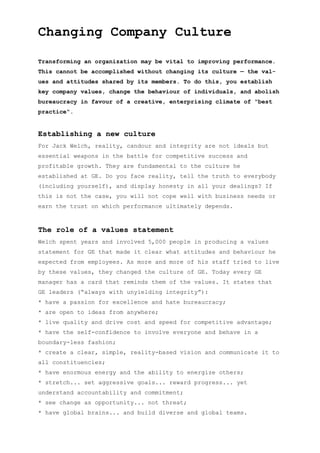Changing companyculture excerpt
- 1. Changing Company Culture Transforming an organization may be vital to improving performance. This cannot be accomplished without changing its culture ŌĆö the val- ues and attitudes shared by its members. To do this, you establish key company values, change the behaviour of individuals, and abolish bureaucracy in favour of a creative, enterprising climate of ŌĆ£best practiceŌĆ£. Establishing a new culture For Jack Welch, reality, candour and integrity are not ideals but essential weapons in the battle for competitive success and profitable growth. They are fundamental to the culture he established at GE. Do you face reality, tell the truth to everybody (including yourself), and display honesty in all your dealings? If this is not the case, you will not cope well with business needs or earn the trust on which performance ultimately depends. The role of a values statement Welch spent years and involved 5,000 people in producing a values statement for GE that made it clear what attitudes and behaviour he expected from employees. As more and more of his staff tried to live by these values, they changed the culture of GE. Today every GE manager has a card that reminds them of the values. It states that GE leaders (ŌĆ£always with unyielding integrityŌĆØ): * have a passion for excellence and hate bureaucracy; * are open to ideas from anywhere; * live quality and drive cost and speed for competitive advantage; * have the self-confidence to involve everyone and behave in a boundary-less fashion; * create a clear, simple, reality-based vision and communicate it to all constituencies; * have enormous energy and the ability to energize others; * stretch... set aggressive goals... reward progress... yet understand accountability and commitment; * see change as opportunity... not threat; * have global brains... and build diverse and global teams.
